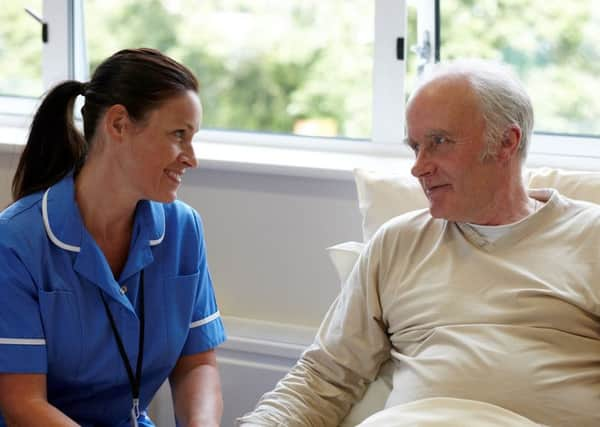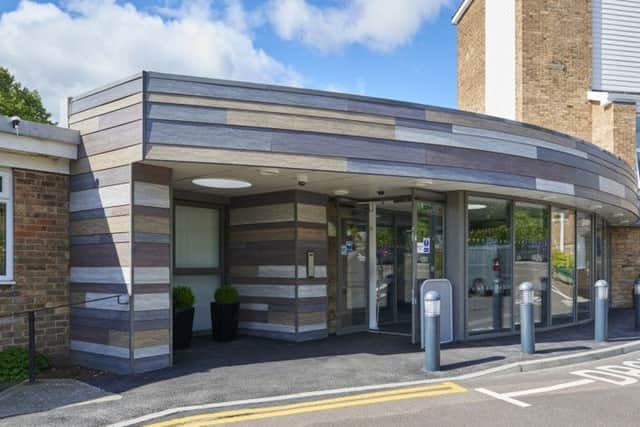FEATURE: 'Recording a life is so precious'


As the trickle of childhood memories becomes a flood, Irene sits up a litle straighter from her slumped position in the bed. Her eyes begin to sparkle, recalling precious moments and loved ones long gone. When it comes, from time to time, the smile that lights up her face is warm and genuine. In that moment, it’s all there is. Everything else, including the cancer, is forgotten, at least for a little while.
Sitting across from her, quietly listening, it’s a reminder to Faith Douglas why she feels so privileged to do this job.


“The brain is an amazing thing,” says Faith.
Advertisement
Hide AdAdvertisement
Hide Ad“Even when the body is on its way out, the brain can be as sharp as anything. If anything, it seems to get brighter and sharper at the end. This lady knew she didn’t have long, but she was so positive, about the life she’d lived, about having her chance to say goodbye. It’s an amazing feeling to unlock somebody’s life, to take them through their best stories and wonderful memories, most likely for the last time. It’s an honour.”
Faith is a volunteer for Sheffield’s St Luke’s Hospice, where she works with the hospice’s Oral History team. In the past five years, the team has helped hundreds of St Luke’s patients to produce their own life histories; capturing their voices and memories and offering them the time to reflect, record their identity and make a record for their family.
“It’s really precious,” says Faith, aged 58.


“So often, when you lose somebody, you have photos and memories, but an oral history leaves their messages and stories in their own words. Sometimes it is an emotional process, for me too, but there’s nothing wrong with showing emotion to someone who is sharing such an intimate moment with you.”
Faith, a former bank manager, began volunteering back in January after hearing about the Oral History project.
Advertisement
Hide AdAdvertisement
Hide Ad“I liked the idea of helping people to tell their stories, of enchancing their lives in a real way, of leaving their families with something so personal,” she says.
“I remember there was a really stringent interview process, which surprised me at the time, but I understand now they need to know you’re the right kind of person.”


Faith has helped four people to compile oral histories so far, interviewing each one up to eight times for a couple of hours per session.
“My job is to be a good listener,” she says simply.
“I take each person through their whole lives - from their childhoods, recalling first best friends and teachers, all the way up to their grandchildren - and once the ball is rolling, I just let them talk. Sometimes it’s sad, but often it’s joyous. I’ve seen people’s eyes light up as they remember things they haven’t thought about in years. It’s a wonderful distraction from where they are now.
Advertisement
Hide AdAdvertisement
Hide Ad“Some people think it must be depressing, to chat with people who are almost at the end of their lives and looking backwards, but I nearly always leave a session feeling uplifted and elated. I’m finding out things about life and history that might have otherwise stayed buried and playing a key role in passing that forward to loved ones. I lost my own mum earlier this year, and I just wish I had done something like this with her, it would have been such a comfort.


“When the person eventually passes, I usually get a call from their relatives to let me know, and one lady’s family even asked me to speak at the funeral, given my familiarity with her life story. It’s really special.”
The hospice currently had three voice recorders and is fundraising to procure more. After each interview, the recorders are returned to service user coordinator Clare Williams, who has been running the Oral History project since it began. Clare does the final edit and adjusts the levels before creating a disc, for the patient to listen back to, before it is passed on to their family.
Clare adds: “Interestingly most patients don’t talk about their illnesses during the recording. They focus on who they were before, on the things they achieved, their families, favourite holidays. Some people talk about their favourite music or read a poem they love. Others leave messages behind for their children or grandchildren; it’s an entirely personal experience.
Advertisement
Hide AdAdvertisement
Hide Ad“It’s also, largely, an uplifting experience. There are sad times, of course, but then life is a mixture and an authentic life story is the good, the bad, and everything in between.
A CALL TO ACTION
Faith Douglas is no stranger to charity work.


She dabbles in all types of fundraisers and has raised cash for countless organisations - sleeping outside in support of the homeless, taking part in sponsored team-building events for Neurocare and hosting a ball for St Luke’s.
“I get annoyed by people who say they don’t have time or money to support local charities,” she says.
“It’s not always about the money, or putting in hours and hours. Give one hour a week, or one morning a month.
Advertisement
Hide AdAdvertisement
Hide Ad“If everybody in the city just did one little bit, think how much better off we’d all be.
“We need people to take a step - and stop making excuses.”
“That is, after all, what makes it a well lived life.”